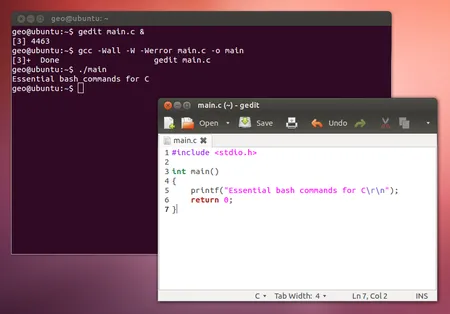Linux Bash Commands For C
Below are a list of the most essential bash commands when working with the c programming language in linux.
Examples tested on Ubuntu v12.04.
# Install GNU C compiler and other essential C programs onto Linux platformsudo apt-get install build-essential
## Creates c file called main.c in current directory and opens gedit to begin editing it# (and frees terminal)gedit main.c &
## Compiles C program main.c with standard flags and creates executable called maingcc -Wall -W -Werror main.c -o main
## Run a compiled executable called main in the current directory# Note that './' is mandatory, otherwise bash will think you have typed a command./main
## Change file permissions on executable called main so that it will run (if experiencing 'Permission denied' errors)chmod +x main
## Compiles C program main.c and creates executable called main with debugging symbolsgcc -Wall -W -Werror main.c -o main -g
## Starts debugging session on compile program called main.# Make sure -g flag was used when compilinggdb main
# GDB commands (omit the (gdb) prefix, this will be present in the terminal already)(gdb) break 16 # Set breakpoint at line 16 (when running gdb)(gdb) run # Run program (when in gdb)(gdb) n # Move to next line(gdb) c # Continue to next breakpoint(gdb) s # Step to next line (unlike n, will jump into functions)(gdb) print x # Print the variable x

